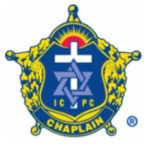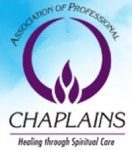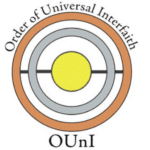Chaplain Qualifications & Endorsements
What is a Chaplain?
Chaplaincy is a unique and special calling for those with the heart and mind to serve others in a variety of institutional and cultural settings. OUnI-aligned clergy now serve in settings that require additional training and education beyond the requirements for ordination and standing in The Order and its lay communities. Unlike most OUnI-ordained clergy who are employed by the laity in their home community, chaplains are employed by an organization or institution with spiritual oversight from the Official Endorser for The Order. The endorser is a member of the Board of Directors with special credentials who is assisted by an advisory committee of volunteers with backgrounds in many forms of chaplaincy.
The Order of Universal Interfaith seeks to be the paradigm of professional excellence in all forms of spiritual service, including chaplaincy. While The Order will work with all who are called to serve these ministries, the Endorser can not always grant waivers from published requirements of The Order or hiring officials. The “Standard of Care” that can be provided by the chaplain must always come first.
Where Can OUnI-endorsed Chaplains Serve?
As previously mentioned, chaplains who desire to serve in some settings may have additional requirements that are not normally imposed on other OUnI-clergy. These may include age, health, education and training, experience, and board certification outside of The Order.
(NOTE: Initially, OUnI clergy used other endorsing bodies to support their ministries. At this time, OUnI is in the process of gaining direct endorsement status in all of these settings.)
- Hospitals and Hospices
- United States military (Active Duty, Reserve, National Guard, Auxiliary, State Militias)
- Police and Fire Departments
- Veterans Administration facilities
- Prisons
- Corporations
To date, OUnI has endorsed to the following organizations successfully:

International Conference of Police Chaplains

Association of Professional Chaplains (APC)
Application Process for All OUnI Chaplain Candidates
The first, and most important step is to contact the Official Endorser for the Order of Universal Interfaith. Once a sincere intention is expressed, a mentor will be appointed to the candidate to assist with all steps towards receiving endorsement to any and all forms of chaplaincy supported by the Order of Universal Interfaith.
Official Endorser and Chair, Committee for Chaplaincy
ATTN: Rev. Dr. Michelle Earnest
Order of Universal Interfaith
704 Airport Blvd.
Ann Arbor, Michigan 48108
For more information contact endorser@ouni.org
Ecclesiastical Qualifications for All Chaplains
These Order of Universal Interfaith requirements represent an ideal candidate for each chaplaincy. The Official Endorser does have the ability to waiver if in his/her opinion the candidate’s qualification and background meets the intent and demonstrates the capabilities of the original list of requirements provided here.
Candidates for Ecclesiastical Approval as Chaplain that will serve in a hospital/ hospice/ prison/ law enforcement or fire department / corporate setting must:
- Be ordained or co-ordained as an OUnI spiritual minister according to the requirements set forth in the document and application for standing. Ministers transferring their credentials to The Order and seeking co-ordination may apply with the Endorser to begin the chaplain’s endorsement process during the initial application. The endorsed chaplain must always maintain good standing with The Order or forfeit endorsement.
- Have a nomination for chaplain status from an OUnI-aligned spiritual community or from a member of the Board of Directors.
- Successfully complete a mentoring program from an OUnI chaplain, appointed by the Endorser, with qualifications in the type of chaplaincy program the applicant is called to serve. The specific requirements are at the discretion of the mentor but must include an extensive interview to determine that the applicant has the background and appropriate expectation for the calling.
- During all interviews and mentoring, demonstrate a willingness to serve all people of all faiths, or no faith at all, as a servant leader. The candidate must be willing to render spiritual service in the most inclusive setting.
- Demonstrate the ability to work in team settings and under supervision of others placed in authority over the chaplain program.
- Demonstrate the desire to continue to improve skills through training as part of a continuing education program. This should include pastoral counseling skills and clinical training. If recommended during the interview process, be willing to enroll in and complete additional training as a condition of endorsement.
- Demonstrate an understanding of the authority of the Endorser to the chaplain candidate. This includes the authority to remove endorsement with cause should the endorsed chaplain violate the codes of ethics placed over them.
- Attend any meetings or gatherings of the Order as specifically required by the Endorser.
- There may be a fee for endorsement paid by the candidate to cover the costs of background checks and other administrative activities of The Order of Universal Interfaith.
Candidates for Ecclesiastical Endorsement as a Department of Defense / National Guard / Veterans Administration / Civil Air Patrol / Coast Guard Auxiliary / State Militia Chaplain must:
- Meet all requirements listed for community chaplaincy mentioned above.
- Successfully complete an interview with an OUnI-aligned military chaplain appointed by the Endorser.
- Meet age and physical requirements of the Armed Forces and other organizations covered by this section.
- Demonstrate the willingness and understanding to serve in a “dual chain-of-command” situation with military and ecclesiastic authority placed upon all chaplains. Understand the nature and importance of rank and line of authority.
- Understand the nature of military chaplaincy and have ability to faithfully represent the Order’s Statement of Faith, Code of Ethics, and values. Understand the ethical systems and core values of the organization where the candidate wishes to serve. Demonstrate a willingness to spiritually serve and minister to all members of the organization where the chaplain will be appointed.
OUnI Support for Chaplains
- OUnI will provide annual meetings to allow all chaplains to gather and renew contacts and build relationships and support networks. While all chaplain’s conclaves should be considered an important requirement for maintaining good standing, situations involving extensive travel or mission/job requirements may restrict some chaplains from attending. There is no change in status when these situations occur.
- The mentor assigned to the chaplain during candidate and application process will continue to be the initial point of contact for issues arising in the ministries of the OUnI chaplain. Mentors are volunteers who understand the importance of relationship to ministry.
- The Committee for Chaplaincy will provide resources for resiliency and support of the chaplain and family during the length of service.
- The Committee for Chaplaincy will be in regular contact with the chaplains, and their families, to provide on-going support.
- OUnI and the Committee on Chaplaincy will develop rituals and ministry tools for all forms of chaplaincy during the entire life cycle of the chaplain.
- The Official Endorser and/or mentor will visit all chaplains in their place of ministry annually, when possible.
- The Official Endorser and/or Committee on Chaplaincy members will visit with all authorities placed over the chaplain should issues arise in the chaplain’s time in ministry. OUnI will provide support and ensure fair treatment.
For questions or more information on any and all information on chaplaincy through endorsement by the Order of Universal Interfaith, please contact the Official Endorser at endorser@ouni.org
